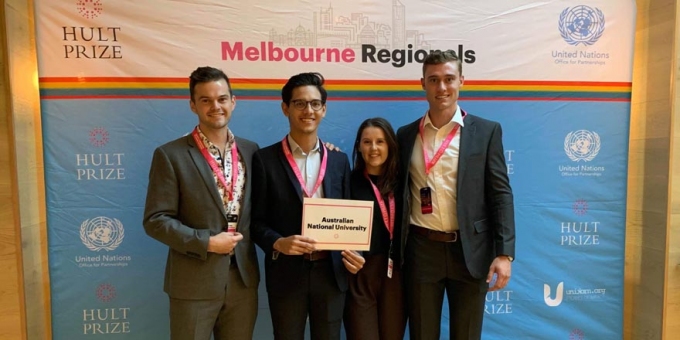Students from the College of Engineering and Computer Science have been working on a social business venture to help improve sanitation, education and employment for girls in Developing Nations.
The interdisciplinary team was comprised of Maddison Fisher (Engineering & Finance), Liam Highmore (Engineering & Business), Matthew McMahon (Commerce & Development Studies) and Nathan Periera (Engineering & Business).
The idea for the venture was sparked by the Hult Prize, an international competition that challenges students to solve a social issue through a market opportunity or social enterprise.
The Hult Prize has been described as “the Nobel Prize for students” by Nobel Laureate Muhammad Yunus, and is in partnership with the United Nations and Bill Clinton.
The 2019 focus was on job creation, and the challenge for each team was to build the foundations of a venture that will provide meaningful work for 10,000 youth within the next decade.
The team decided to tackle this challenge – with the innovative business concept ‘Vequal’.
In rural India, women’s access to affordable sanitary health products is extremely limited. The team tried to address this by empowering women to manufacture and distribute their own sanitary products.
Liam Highmore, spokesperson for the team, described their proposal to address the issue.
“We use an education-based approach to employ and train young Indian women to establish their own businesses which can then provide access to affordable and hygienic sanitary care products. In doing so, we create direct employment opportunities for women whilst increasing the chances of future employment by keeping girls in school.”
The group was able to put many of the skills of their engineering degrees to use.
“We used a systems engineering approach, breaking it down into smaller sub systems and used several tools to derive ideas and insights from the problem” said Liam.
The Vequal team strongly believes that the answer to the world’s wicked humanitarian issues can be solved through engineering thinking, combined with an interdisciplinary lens.
“Traditional engineering approaches are quickly becoming redundant which is creating the need to reimagine engineering for the 21st century. Engineering will play a critical role in tackling many of the world’s greatest issues.”
The team did exceptionally well in the competition, making it to the regional finals, and were one of only three Australian teams out of 30 international teams.
Despite not making to the final round, the group has had interest from other humanitarian organisations, and plans to pilot the idea in Vanuatu, later this year.

